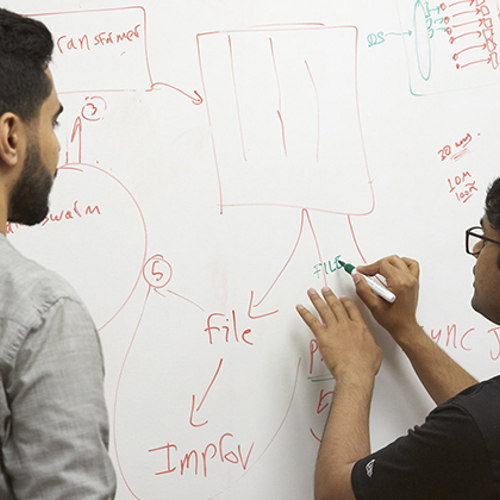Sure, everyone wants to become a DevOps engineer. But I’m not sure they realise that at times it’s akin to playing the role of ‘marriage counsellor’. In a DevOps role, you are sitting comfortably in your leather chair, acting as the go-between, attempting to break down the silos and unite the operational and technical sides of the business with a common goal.
By taking ownership of software applications, from the initial design phase through to deployment and beyond, DevOps engineers have complete oversight of the bottlenecks that prevent progress being made and ultimate success realised.
Through DevOps, organisations launch better quality products quicker, with less downtime and fewer project failures - you are the reason for their success.
How to do I start a career in DevOps engineering?
Choosing to study the BCS DevOps certification offers the ideal introduction for individuals and organisations who are moving towards more agile ways of working. With framework-agnostic training, DevOps values sit at the heart of every discussion, supported by practical examples that bring these values to life.
Discover more about the BCS DevOps certification
In an increasingly digital world, we become ever more reliant on new technologies and applications to enrich the quality of our lives and make them easier - both at home and at work. Perhaps unsurprisingly then, demand for DevOps engineers is currently on the rise - according to a talent report from LinkedIn, it’s the most recruited-for role on the platform.
Want to stand out from the crowd in this field? Choose to certify with BCS and you can benefit from the partnership we have with the DevOpsGroup Academy. Together, we have specifically designed our course to be agnostic and enable anyone to study, regardless of their technical background or current role - it’s a great stepping stone into a career in the world of DevOps.
So, what are the key steps to become a DevOps engineer?
We’re giving you a rundown of the top 6 skills you will need to become successful in DevOps. According to the DevOps Institute, organisations want ‘T-shaped’ professionals to join their teams, who have cross-functional skillsets, blending specialist technical skills with broader general knowledge.
1. Technical skills
The core, specialist skill for any DevOps engineer lies in their technical abilities. Ultimately needing to create the applications the business requires, it’s going to be a pretty tough ask without any technical knowledge, so at the very least you need a basic understanding of software development languages, IT infrastructure and automation tools.
However, a good DevOps engineer is always curious, always seeking to learn about new technologies and innovations, and testing them within their working process.
And a great DevOps engineer?
That’s the person who has the ability to understand the wider technology landscape. Knowing how to combine data centre-based components with cloud-based infrastructure and then adopting new systems, applications or platforms to enable the business to take advantage of ‘best-of-breed’.
Our DevOps Academy partnership course covers everything from what DevOps is, to the benefits it offers; the CALMS model (which is the foundation for all DevOps transformations); before looking at different practices, techniques and deep dives into agile and scrums.
2. Automation skills
According to the DevOps Institute, Automation is the most important skill you’ll need to become a DevOps engineer.
In reality, almost all manual tasks can be automated using scripting languages and by automating parts of the process, it speeds up the development and deployment process exponentially. One report on ZDNet says that ‘automating the testing and quality assurance aspect can deliver ROI up to 250% to 300% month over month.’
The majority of organisations are looking to grow; enabling that seamless scalability sits completely within the DevOps engineer’s remit. Take the time to understand what you can automate within the process and dedicate sufficient resource to make it happen - in the long run it will pay dividends.
3. Process skills
In at no.2 in the DevOps Institute’s ‘2019 Upskilling: Enterprise DevOps Skills Report’ is process skills, which are crucially required for intelligent automation. DevOps creates a much faster cycle for developing and deploying code. As we’ve just discussed, key to this is automating parts of the process wherever possible so the business is less reliant on manual input.
But, process skills aren’t just about making things quicker...
Process is also about making things better. There’s no point getting a product to market quickly if it doesn’t work as intended, is full of bugs, or presents a horrible interface that users don’t want to use.
By building a thorough and robust process, you ingrain testing at regular intervals. Usually working in ‘sprints’, you continually test, evaluate and tweak the project to ensure it continues to do what it’s designed to do and avoid any surprises when it comes to launch and roll out.
4. Security skills
Hackers are actively looking to target the smallest chink in an organisation’s armour in order to access the valuable data that lies within the organisation. Faster development times lead to the increased risk that more vulnerabilities are introduced to the code.
For you
Be part of something bigger, join BCS, The Chartered Institute for IT.
DevSecOps (Security DevOps) is a key skill because it ensures the organisation remains protected and reduces the costs involved later if a breach occurs or problems arise that need fixing. The role encompasses anything from code analysis to threat investigation, vulnerability management and security training.
A good DevOps engineer understands the importance of security and will build it into the application from the start, rather than bolting it on at the end as an afterthought. This means knowing how to write secure code to protect the application against attack, as well as defending the end product against common cyber threats.
5. Customer skills
DevOps isn’t typically a customer-facing role, but that doesn’t mean you can ignore customers. In fact, as an engineer, your role is more complex as you balance the requirements of the organisation’s end customers, as well as the wants and needs of your internal ‘customers’ - the operations, development, and product teams.
A good DevOps engineer understands the motivations that drive each business stakeholder. They understand the personal objectives they have to hit and the things they’re responsible for within their role. Knowing this context, you’re able to empathise with the stakeholders, balance everyone’s priorities and ensure transparent communication so everyone has a common understanding of what’s being proposed and why.
A great DevOps engineer is focused on delighting the end customer though, always thinking of how the product that’s being built sits within the wider experience the organisation is delivering to that customer.
When you’re creating software that focuses on customer-centric improvements, the customers do notice. Research from Forrester shows that customers who feel valued are 92% more likely to stay with the brand and increase their spending by 88%. Not only does this increase revenue, Forrester has also found a correlation with a company’s stock price - a 29-point difference.
6. Soft skills
Finally, we come to the important skillset that underpins everything you do - soft skills, which encompass traits like communication, teamwork, interpersonal skills and flexibility.
To become a successful DevOps engineer, you need to collaborate with developers, testers, operations teams and senior business stakeholders. You may also have third parties to involve and, of course, the end customer to consider.
A great DevOps engineer works hard to understand individuals’ preferences for working styles and communication, as well as the culture that runs through the organisation. They then build a strategy that focuses on simplifying the operating environment and brings everyone along on the journey in order to facilitate the cultural shift and achieve the buy-in required for the change to stick.
The BCS DevOps certification
BCS courses are built on our 25-year reputation for exam quality, integrity and impartiality. The biggest benefit of choosing to study with us is that your course aligns with the industry leading ‘Skills Framework for the Information Age (SFIA)’. As such, your new qualification will be recognised across 200 countries worldwide.
We’ve taken the framework one step further to create SFIAplus, where each skill level is supplemented with 6 additional task definitions and 8 additional skills resources. Using SFIAplus, organisations worldwide are raising the level of professionalism within their IT teams and meeting their business objectives through technology-led innovation.
As an individual, SFIAplus benefits you with:
- Unparalleled visibility: a clear vision of the skills and attributes required for each stage of your career.
- Transparency and understanding: of the role you play and value you bring to the bigger picture.
- Stronger performance: capabilities that map to the industry’s standards.
- Appeal to top recruiters: raise your profile with a qualification that offers highly transferrable skills.
Discover more about how SFIAplus benefits your career
Not yet a member of BCS?
To take full advantage of our courses you need to be a member of BCS. If you’ve not yet signed up, perhaps these six reasons will persuade you:- For 60 years, BCS has been shaping the future of our industry.
- 1500+ mentors and mentees who regularly share their knowledge and experience.
- 250,000 BCS professional certifications have been awarded across the industry.
- With 1000+ annual events and 150+ specialist interest groups, there’s plenty of opportunities to get involved with the community.
- Keep up to date with industry developments through ITNOW and industry reports.
- Membership fees start from just £20 per year for students and apprentices.
Image credit: This Is Engineering

















